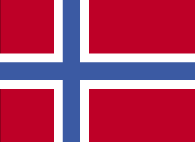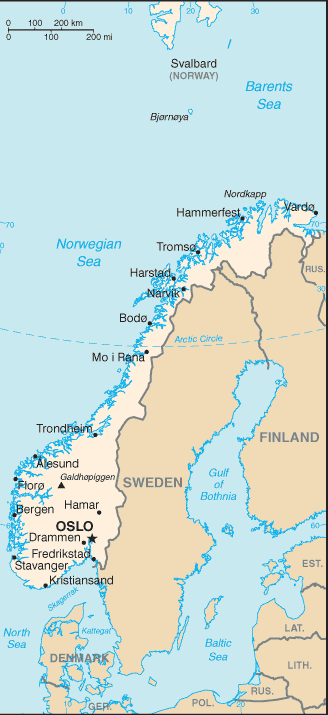Table of Contents
| Location and Size | Credit and Collections |
| Government | Risk Assessment |
| Legal System | Business Climate |
| People | Business Protocol |
| Economy | |
| Comparative Indicators |
12345
Location and Size
Norway is located in Northern Europe (Scandinavia), bordering the North Sea and the North Atlantic Ocean, west of Sweden. Its land area is 304,282 sq km, making Norway slightly larger than Mexico.
Government
Norway is a constitutional monarchy made up of 19 counties and 3 dependent areas.
Branches:
- Executive: Chief of state King Harald V (since 17 January 1991); Head of government Prime Minister Jonas Gahr (since October 2022); cabinet – State Council appointed by the monarch with the approval of parliament
- Legislative: Modified unicameral Parliament, 169 seats
- Judicial: Supreme Court appointed by the monarch
Legal System
Norway’s legal system is a mixture of customary law, civil law and common law.
Norway has accepted compulsory International Court of Justice (ICJ) jurisdiction with restrictions.
People
- Population: 5,553,8401 (2022 est.)
- Population growth rate: 0.6% (2022 est.)
- Languages: Norwegian, English and Sami
- Literacy: 100% (2022)
- Ethnic Make-up: Norwegian 81.5%, European 8.9%, other 9.6%
- Religions: Church of Norway 67.5%, Muslim 3%, other 3%, None 19%
Economy
Norway is one of the world’s richest countries in per capita terms. Its economy is a combination of free market activity and government intervention. The government controls key areas, such as the petroleum sector, through large-scale, state-majority-owned enterprises. The country is richly endowed with natural resources, including petroleum, hydropower, fish, forests, and minerals. Norway is highly dependent on the petroleum sector, which accounts for nearly half of exports and more than 30% of state revenue.
Norway has been greatly impacted by the current global economic recession, however, its drop in production was less severe than in other countries. The authorities immediately reacted with several measures aimed at reestablishing the credit markets’ normal performance and stimulating production.
Leading Markets (2022): UK 21.1%, Germany 15.5%, Netherlands 9.9%, Sweden 6.6%, France 6.4%, Belgium 4.8%, Denmark 4.7%, US 4.82%
Leading Exports – Commodities: Petroleum and petroleum products, machinery and equipment, metals, chemicals, ships, fish
Leading Suppliers (2022): Sweden 13.86%, Germany 12.89%, China 7.8%, Denmark 6.78%, US 6.16%, UK 6.01%
Leading Imports – Commodities: Machinery and equipment, chemicals, metals, foodstuffs
Top Industries: Machine building, iron and steel, coal mining, chemicals, ship building, food processing, glass, beverages, textiles
Top Agricultural Products: Potatoes, fruits, vegetables, wheat; poultry, eggs, pork, dairy
Comparative Economic Indicators – 2022
| Norway | Sweden | Finland | Denmark | Poland | USA | |
| Population* (millions) | 5.46 | 10.20 | 5.57 | 5.86 | 38.28 | 329.5 |
| Population growth rate* (%) | 0.85 | 0.79 | 0.30 | 0.48 | -0.30 | 0.4 |
| Literacy (%) | 100.0 | 99.0 | 100.0 | 99.0 | 99.8 | 96.0 |
| Unemployment rate (%) | 4.5 | 8.3 | 8.5 | 4.3 | 8.9 | 4.3 |
| Inflation (%) | 2.1 | -0.3 | 0.0 | 1.3 | 3.5 | 8.25 |
| Population below poverty line (%) | N/A | N/A | N/A | 12.1 | 17.0 | 12.0 |
| GDP** (USD billions) | 267.4 | 331.4 | 178.8 | 197.8 | 689.3 | 1,414.0 |
| GDP real growth rate (%) | 1.1 | -5.1 | -8.1 | -4.7 | 1.7 | 1.6 |
| GDP per capita** (USD) | 70,400.0 | 36,600.0 | 34,100.0 | 36,000.0 | 17,900.0 | 57,000.0 |
| Public debt (% of GDP) | 60.6 | 35.8 | 44.0 | 41.6 | 46.5 | 61.14 |
| Exports (USD billions) | 122.8 | 130.8 | 62.9 | 91.5 | 139.5 | 1,046.0 |
| Imports (USD billions) | 65.8 | 120.5 | 59.0 | 84.7 | 144.3 | 1,563.0 |
| Reserves of foreign exchange and gold (USD billions) | 48.9 | 47.3 | 11.5 | 76.7 | 79.6 | 130.8 |
| Currency | Kroner NOK |
Krona SEK |
Euro EUR |
Krone DKK |
Ziotych PLN |
Dollar USD |
| Exchange rate (per USD) 9/7/2022 | 9.25 | 9.66 | 0.92 | 6.88 | 3.92 | N/A |
| Exchange rate (per EUR) 9/7/2022 | 10.04 | 10.48 | N/A | 7.47 | 4.26 | 1.09 |
*2022 Estimates
Data from CIA World Factbook
Credit and Collections
Dispute Resolution
Norway has ratified principal international agreements governing arbitration and settlement of disputes, including the New York 1958 Convention on the Recognition and Enforcement of Foreign Arbitral Awards.
Norway’s legal system is well developed and provides effective means for enforcing property and contractual rights. Laws governing commercial matters are consistently applied without undue government interference.
Risk Assessment
Coface Country Risk Rating: A1— The political and economic situation is very good. The country boasts a stable and efficient business environment. Corporate default probability is very low.
Coface Business Climate Rating: A1 — The political and economic situation is very good. A quality business environment has a positive influence on corporate payment behavior. Corporate default probability is very low.
Business Climate
The Norwegian economy enjoys vibrant entrepreneurial activity and high levels of prosperity. The country has a strong tradition of openness to global trade and investment, and transparent and efficient regulations.
Norwegian voters have rejected membership in the European Union in two referenda. Instead, the country maintains close economic interaction with EU members under the European Economic Area (EEA) agreement.
Market Access: Norway generally treats private and public enterprises equally in terms of market access. Foreign investors are in most cases permitted to participate freely in privatizations of Norwegian state firms.
Transparency of Regulatory System: The transparency of Norway’s regulatory system is generally on par with that of the European Union. Norway is obliged to adopt EU directives under the terms of the EEA accord.
Intellectual Property Rights: Norway adheres to key international agreements for the protection of intellectual property rights (e.g., the Paris Union Convention for the Protection of Industrial Property, the Berne Copyright Convention, the Universal Copyright Convention of 1952, and the Rome Convention). However, internet piracy does exist in Norway and the authorities have not undertaken any serious efforts to combat internet or other piracy of copyrighted property.
Enforcement of IPR protections is inconsistent. Norwegian police and judicial authorities are generally committed in principle to taking action against piracy and intellectual property rights infringement. However, the authorities lack the capability and resources to handle such complaints.
Counterfeit and Pirated Goods: Norway does not expressly ban imports of counterfeit or pirated goods. A trademark or copyright holder must obtain a court order and have the case referred to the police before customs authorities will take action to stop entries of pirated goods.
Conversion and Transfer Policies: Ordinary payments from Norway to foreign entities can normally be made through commercial banks.
Economic Freedom: Norway’s economic freedom score is 76.9, making its economy the 14th freest in the Heritage Foundation’s 2022 Index of Economic Freedom. Norway is ranked 26th out of 44 countries in the European region, and its overall score is well above the world and regional averages.
Political Violence: Norway is a stable democracy where violent political protests or incidents are extremely rare. There have been no recent occasions of politically motivated attacks on foreign commercial projects or property.
Business Protocol
Norwegians do not require long-standing personal relationships in order to conduct business. Nor do they require face-to-face contact. Their basic business style is relatively informal. They are scrupulous about honesty in communication.
**********
Subscribe to the Credit-to-Cash Advisor
Monthly e-Newsletter — It’s Free
This information is provided by ABC-Amega Inc. Providing international receivable management and debt collection services for exporters to more than 200 countries. For further information, contact [email protected].
Historical Exchange Rates: OANDA.com The Currency Site.

